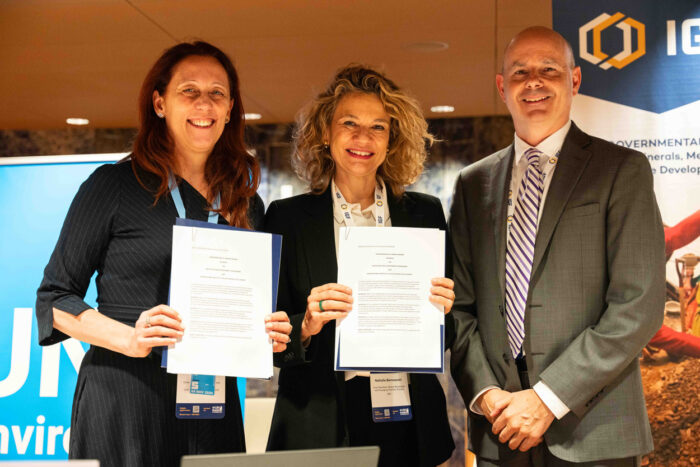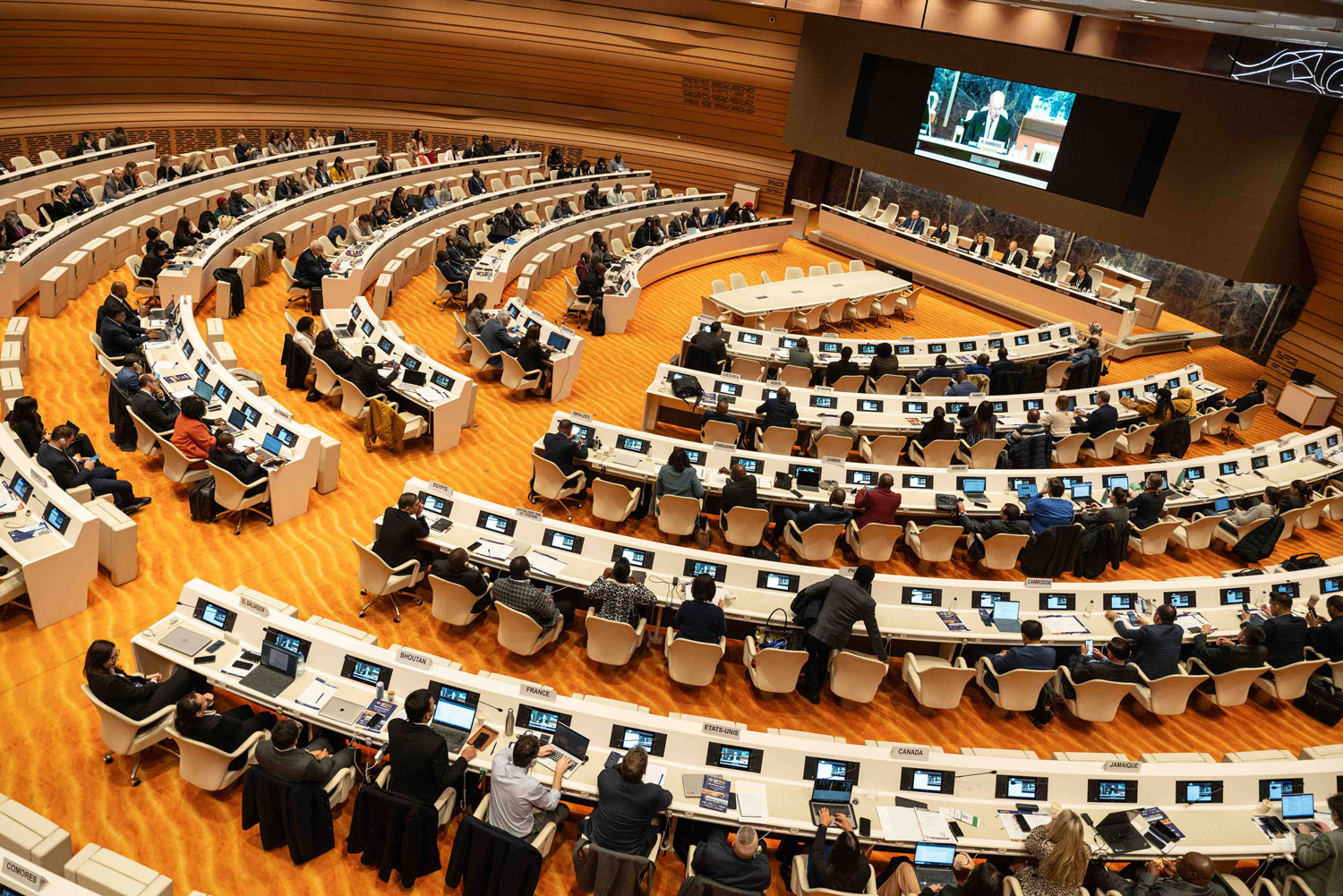
From left, Elisa Tonda, Chief, Resources and Markets Branch, UNEP, Nathalie Bernasconi-Osterwalder, Vice President Global Strategies and Managing Director Europe, IISD, and Greg Radford, Director, IGF, after signing a memorandum of understanding at the 20th IGF AGM in Geneva. Photo by IISD/ENB | Mika Schröder
Geneva, 18 November 2024 – The United Nations Environment Programme (UNEP) and the IGF signed a memorandum of understanding during the 20th IGF Annual General Meeting (AGM). With the new agreement, the two partners solidified their commitment to work together and strengthen the environmental sustainability of minerals and metals management.
Minerals and metals play a major role in the global economy. The sector provides employment to millions and contributes significantly to the world’s gross domestic product. The associated value chains affect the environment, contribute to greenhouse gas emissions, impact biodiversity where habitats and ecosystems are disrupted by land disturbance and deforestation, and release pollutants—such as heavy metals or toxic chemicals—into air, soil and water.
By working together, UNEP and IGF will leverage their strengths and networks to bring mining, minerals, and metals closer to the 2030 Agenda for Sustainable Development and relevant multilateral environmental agreements, including through sustainable consumption and production and enhanced sustainability practices.
“We are honoured to formalize our partnership with IGF, a valued partner for UNEP’s work on mining, minerals and metals since 2022 when the United Nations Environment Assembly (UNEA) adopted resolution 5/12 on Environmental Aspects of Minerals and Metals Management,” said Elisa Tonda, Chief, Resources and Markets Branch, Industry and Economy Division, UNEP. “We look forward to enhancing our partnership to further accelerate progress on achieving environmental sustainability of minerals and metals.”
“We are delighted to build on this already strong partnership through this agreement. UNEP has unique expertise and experience that will benefit IGF’s 85 member countries seeking to strengthen environmental governance in the mining sector,” said Greg Radford, Director at IGF. “Together, we aim to enhance environmental stewardship in resource-rich countries, echoing the theme of our General Meeting this year—Balancing the Need for Minerals with Protecting People and the Planet—into concrete, effective actions that benefit our member countries and advance sustainable development.”
Under the terms of the signed memorandum of understanding, over the next 2 years, UNEP and IGF will
- facilitate exchanges between IGF and UNEP networks to build bridges toward sound environmental management of minerals and metals;
- support the implementation of UNEA resolution 6/5 through the development of joint capacity-building opportunities, such as online and in-person training and workshops on enhancing environmental sustainability of minerals and metals management, including on the topics of circularity as well as net-zero, nature-positive, and pollution-free mine closure and rehabilitation;
- collaborate on synergistic activities related to management of artisanal and small-scale mining, including handling of artisanal and small-scale gold mining tailings;
- partner on the development of a digital knowledge hub to compile, among other things, information on existing good practices relevant to the environmental aspects of minerals and metals as requested by UNEA resolution 6/5;
- collaborate on joint activities emanating from the UN Secretary-General Panel on Critical Energy Transition Minerals and activities that support the UN Framework on Just Transitions for Critical Energy Transition Minerals;
- organize joint events and meetings on minerals and metals management at international conferences on mining.
Most recently, UNEP and IGF provided technical expertise and best practices on mine closure and rehabilitation at a two-day workshop for policy-makers and other stakeholders from Africa on environmental and social aspects of critical energy transition minerals and the African mining vision.
The Intergovernmental Forum on Mining, Minerals, Metals and Sustainable Development (IGF) supports its 85 member countries in advancing their sustainable development goals through effective laws, policies, and regulations for the mining sector. IGF helps governments take action to develop inclusive and gender-equitable practices, optimize financial benefits, support livelihoods, and safeguard the environment. Its work covers the full mining life cycle, from exploration to mine closure, and projects of all sizes, from artisanal mining to large-scale operations.

